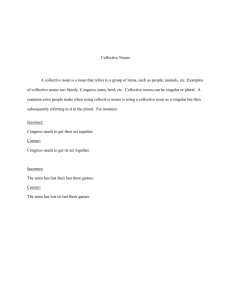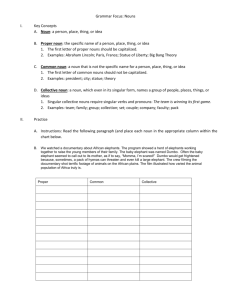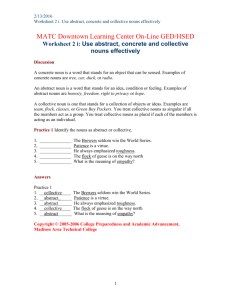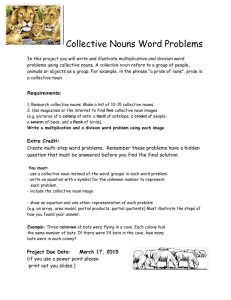NOUNS Classes (semantic criterion):
advertisement
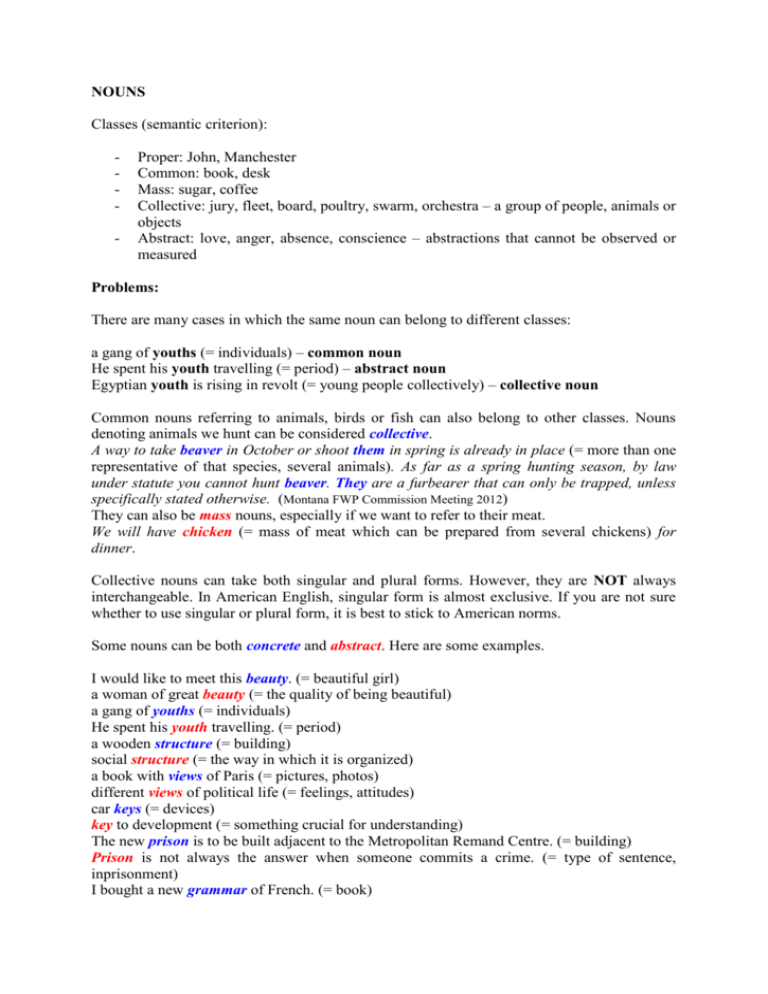
NOUNS Classes (semantic criterion): - Proper: John, Manchester Common: book, desk Mass: sugar, coffee Collective: jury, fleet, board, poultry, swarm, orchestra – a group of people, animals or objects Abstract: love, anger, absence, conscience – abstractions that cannot be observed or measured Problems: There are many cases in which the same noun can belong to different classes: a gang of youths (= individuals) – common noun He spent his youth travelling (= period) – abstract noun Egyptian youth is rising in revolt (= young people collectively) – collective noun Common nouns referring to animals, birds or fish can also belong to other classes. Nouns denoting animals we hunt can be considered collective. A way to take beaver in October or shoot them in spring is already in place (= more than one representative of that species, several animals). As far as a spring hunting season, by law under statute you cannot hunt beaver. They are a furbearer that can only be trapped, unless specifically stated otherwise. (Montana FWP Commission Meeting 2012) They can also be mass nouns, especially if we want to refer to their meat. We will have chicken (= mass of meat which can be prepared from several chickens) for dinner. Collective nouns can take both singular and plural forms. However, they are NOT always interchangeable. In American English, singular form is almost exclusive. If you are not sure whether to use singular or plural form, it is best to stick to American norms. Some nouns can be both concrete and abstract. Here are some examples. I would like to meet this beauty. (= beautiful girl) a woman of great beauty (= the quality of being beautiful) a gang of youths (= individuals) He spent his youth travelling. (= period) a wooden structure (= building) social structure (= the way in which it is organized) a book with views of Paris (= pictures, photos) different views of political life (= feelings, attitudes) car keys (= devices) key to development (= something crucial for understanding) The new prison is to be built adjacent to the Metropolitan Remand Centre. (= building) Prison is not always the answer when someone commits a crime. (= type of sentence, inprisonment) I bought a new grammar of French. (= book) English grammar is difficult (= abstract system of rules) That chair is old. (= furniture) Politicians were fighting for the chair. (= position; something that brings power) Expert grammarians sometimes argue about whether a given noun is concrete or abstract. In the sentence, England has an outstanding national football team, it is debatable whether the noun 'team' is concrete because it refers very specifically to a team of identifiable players or abstract because it refers to the notion of a group of people working collectively together. (Cybergrammar, University of Exeter) Conclusion: An abstract noun refers to intangible concepts such as states, events, concepts, feelings, qualities, etc., that have no physical existence. We will use this distinction for the exam. If it is easier, you can use another distinction as a rough guideline – material vs. immaterial, but we will NOT call them material/immaterial. order command; poredak? flaw (personality flaw), flaw (mis-stitch, crack) the stale odor of cigarette smoke VS the odor of suspicion Exam tips 1. In the following sentences identify all the nouns according to their class, number, case and gender: The friendly staff treated them with love and affection. staff – collective, uncountable, singular, subjective case, collective gender love – abstract, uncountable, singular, objective case, unmarked for gender affection – abstract, uncountable, singular, objective case, unmarked for gender When identifying the class, always make sure you have taken into account both the semantic criterion and countability. That is why staff is classified as collective and countable. When identifying the collective gender of nouns, don’t forget to put the word ’gender’, because it is not clear whether the word ’collective’ (if it is used alone) refers to collective nouns or to collective gender.
